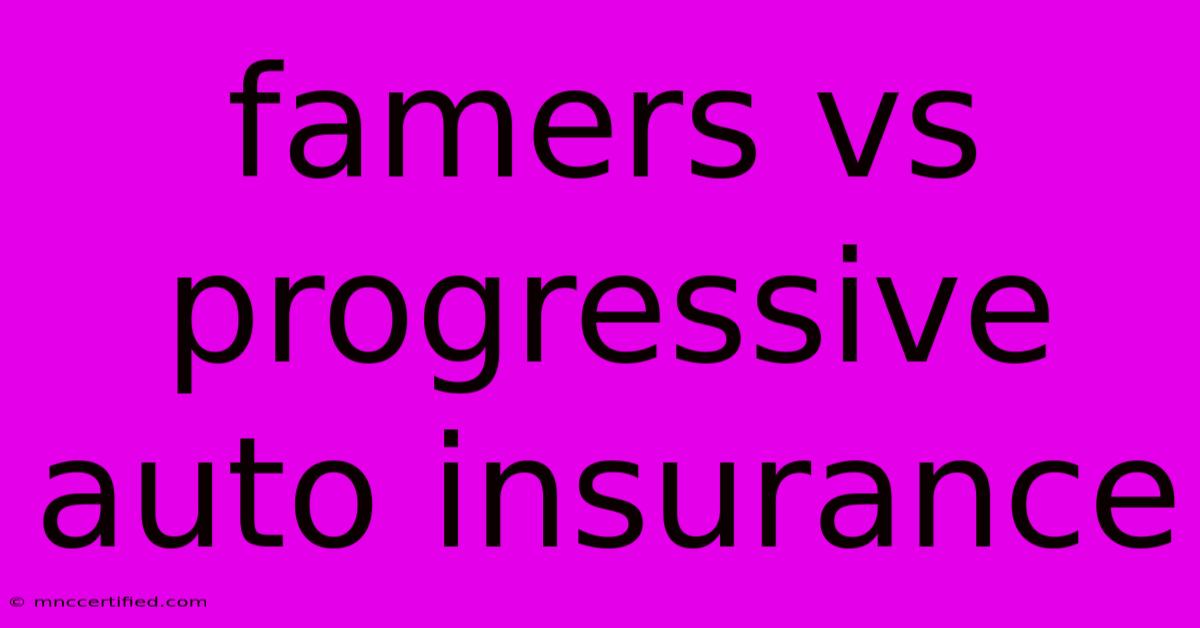Famers Vs Progressive Auto Insurance

Table of Contents
Farmers vs. Progressive: Which Auto Insurance Is Right for You?
Finding the right auto insurance can feel like a daunting task, especially when you're faced with numerous options. Two of the most popular contenders are Farmers Insurance and Progressive Insurance. Both are well-established companies with a strong presence in the market, but they cater to different needs and offer distinct features.
This guide will delve into a comprehensive comparison of Farmers and Progressive, exploring their pros and cons, coverage options, and pricing to help you make an informed decision.
Key Differences Between Farmers and Progressive:
- Company History: Farmers has a longer history, established in 1928, while Progressive was founded in 1937.
- Distribution: Farmers relies heavily on independent agents, while Progressive uses a direct-to-consumer model, with online and phone options.
- Target Audience: Farmers typically attracts customers seeking traditional insurance plans, while Progressive focuses on offering a more customizable and digital-driven approach.
Farmers Insurance: A Traditional Approach
Pros:
- Strong network of independent agents: This provides personalized service and local expertise.
- Wide range of coverage options: Offers comprehensive coverage, including umbrella insurance and specialty options for unique needs.
- Excellent customer service: Farmers consistently ranks highly for customer satisfaction.
Cons:
- Limited online access: May require phone calls or visits to agents for quote requests and policy management.
- Potentially higher premiums: Farmers' emphasis on personalized service can sometimes translate to higher rates compared to direct competitors.
- Less innovation in technology: While Farmers offers online tools, their digital presence is not as advanced as Progressive.
Progressive Insurance: A Digital-First Approach
Pros:
- Convenient online platform: Manage policies, pay bills, and get quotes entirely online.
- Innovative pricing tools: Progressive's "Name Your Price" feature allows you to set a budget and find a policy that fits.
- Discounts and rewards programs: Offers various discounts based on driving behavior and safe driving habits.
Cons:
- Less personal touch: Direct-to-consumer model can lack the personalized experience of working with an agent.
- Potential for higher deductibles: Some of their policies offer lower premiums with higher deductibles.
- Limited coverage options: While Progressive offers standard coverage, it may not have as many specialty options as Farmers.
Comparing Coverage Options:
Both Farmers and Progressive offer the following standard auto insurance coverage:
- Liability insurance: Covers bodily injury and property damage to others in case of an accident.
- Collision insurance: Covers repairs or replacement of your vehicle if you're involved in an accident.
- Comprehensive insurance: Covers damage to your car from events like theft, vandalism, or natural disasters.
- Uninsured/Underinsured Motorist Coverage (UM/UIM): Provides protection if you're involved in an accident with someone who doesn't have adequate insurance.
Getting a Quote:
The best way to determine which insurance provider is right for you is to compare quotes. Both Farmers and Progressive have online quote tools, and you can also contact their customer service lines to discuss your needs.
Tips for getting the best quote:
- Be prepared to share your driving history and vehicle information.
- Consider your specific needs and coverage requirements.
- Shop around and compare quotes from multiple providers.
- Ask about available discounts and bundle options.
Conclusion:
Ultimately, the best auto insurance provider for you depends on your individual needs and priorities. If you value personal service and comprehensive coverage, Farmers Insurance may be a good fit. If you prefer a digital-first approach with innovative pricing tools and discounts, Progressive Insurance might be a better option.
By carefully evaluating your needs and comparing quotes from both companies, you can make an informed decision and secure the best auto insurance policy for your situation.

Thank you for visiting our website wich cover about Famers Vs Progressive Auto Insurance. We hope the information provided has been useful to you. Feel free to contact us if you have any questions or need further assistance. See you next time and dont miss to bookmark.
Featured Posts
-
Chemical Bonds Ionic Bonds Worksheet
Nov 11, 2024
-
Manchester United 3 0 Leicester City Match Report
Nov 11, 2024
-
Wolf Halls Sequel The Mirror And The Light
Nov 11, 2024
-
Easy Jet Share Price Experts See 664p Potential
Nov 11, 2024
-
The Flippening Dogecoin Takes Lead Over Xrp
Nov 11, 2024